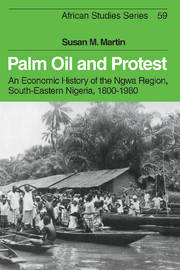Book contents
- Frontmatter
- Contents
- List of maps and figure
- Acknowledgements
- Abbreviations
- 1 Introduction
- 2 Ecology, society and economic change to 1891
- 3 The Ngwa and colonial rule, 1891–1914
- 4 The expansion of the oil palm industry, 1884–1914
- 5 The end of the boom
- 6 Cassava and Christianity
- 7 Authority, justice and property rights
- 8 Trade, credit and mobility
- 9 Production and protest: the Women Riot, 1929
- 10 Cash cropping and economic change, 1930–80
- 11 Conclusion
- Statistical appendix
- Notes
- Interviews conducted in the Ngwa region, 1980–1
- Bibliography
- Index
6 - Cassava and Christianity
Published online by Cambridge University Press: 11 September 2009
- Frontmatter
- Contents
- List of maps and figure
- Acknowledgements
- Abbreviations
- 1 Introduction
- 2 Ecology, society and economic change to 1891
- 3 The Ngwa and colonial rule, 1891–1914
- 4 The expansion of the oil palm industry, 1884–1914
- 5 The end of the boom
- 6 Cassava and Christianity
- 7 Authority, justice and property rights
- 8 Trade, credit and mobility
- 9 Production and protest: the Women Riot, 1929
- 10 Cash cropping and economic change, 1930–80
- 11 Conclusion
- Statistical appendix
- Notes
- Interviews conducted in the Ngwa region, 1980–1
- Bibliography
- Index
Summary
After the decade of prosperity which had ushered in the colonial period, the Ngwa found themselves confronted by a series of commercial crises. In this chapter and the three which follow, their reactions to these crises and to the long-term decline in palm produce prices will be explored. Initially, they attempted to improve their terms of trade for palm produce by boycotts and by produce adulteration. However, neither of these strategies proved viable even in the short term: in the long term the Ngwa needed to search for alternative sources of cash.
During the First World War, the Ngwa began to make two major changes in their way of life; they began to adopt cassava and Christianity. Both of these changes were slow to spread through Ngwa society, yet ultimately cassava was to prove an attractive alternative to palm produce as a source of cash, while the education which often accompanied Christian conversion offered an escape route from the rural community itself. Women and junior men were the first to seize these opportunities, which for them held the additional attraction of being outside the economic sphere controlled by senior men. This chapter will outline the causes of their early enthusiasm for cassava and Christianity, which lay both in the contemporary circumstances summarised above, and in the distinctive advantages offered by the new crop and the new religion within the existing Ngwa way of life. In later chapters the story will be followed through to show the way in which Ngwa men and women turned these advantages to practical use in meeting the challenges posed by export sector decline and changing national political structures.
- Type
- Chapter
- Information
- Palm Oil and ProtestAn Economic History of the Ngwa Region, South-Eastern Nigeria, 1800–1980, pp. 67 - 77Publisher: Cambridge University PressPrint publication year: 1988



